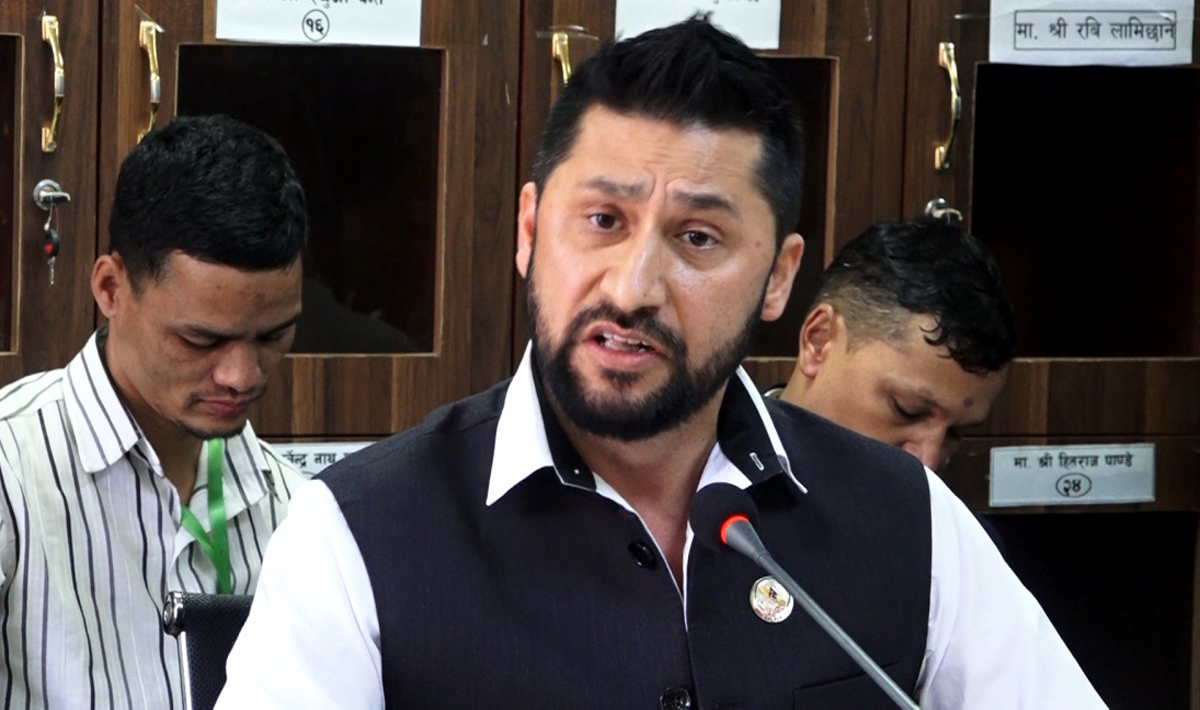KATHMANDU: Rabi Lamichhane, Chairman of the Rastriya Swatantra Party (RSP), has been in Kaski police custody for 31 days since his arrest on October 19 in connection with the embezzlement of savings from cooperatives.
As Lamichhane’s detention continues, concerns are rising among party leaders and activists.
He was arrested at the party’s central office in Kathmandu, and the ongoing situation has prevented the RSP from fielding candidates in the local level by-elections to be held on December 1 across 42 municipalities.
Specifically, the party was unable to present candidates for 16 local positions, including the mayor of Kirtipur Municipality and the chairpersons for Wards No. 4 and 1.
Emerging from Rabi’s popularity, the RSP had won six federal parliamentary seats in the Kathmandu Valley during the 2079 BS elections.
However, the party is now facing a crisis as it grapples with Lamichhane’s legal troubles.
The party, which won 21 federal parliamentary seats, including one in the recent Tanahun by-election, is struggling without its leader.
Lamichhane fears that once Joshi arrives in Kathmandu for the Swarna Laxmi case, he may face an extended detention due to potential legal loopholes.
Rabi, who has recently resolved issues related to his citizenship and passport, now finds himself in deeper trouble due to allegations involving the illegal deposit of millions from five cooperatives into the Gorkha Media Network, where he served as Managing Director.
While the primary charge against him is cooperative fraud, the government has also launched investigations into organized crime and money laundering.
As a result, Lamichhane, who has been in custody for a month, could potentially remain detained for an additional two months.
Meanwhile, former DIG Chhabilal Joshi is expected to be brought to Kathmandu for questioning.
While preparations are underway for Joshi’s transfer from Kaski police custody, Lamichhane will remain there.
Joshi has been arrested, and concerns are mounting for Lamichhane as Joshi is brought to Kathmandu for an investigation related to the Swarna Laxmi Multipurpose Cooperative fraud case.
On Monday, the Kathmandu District Court issued an arrest warrant for Lamichhane in the cooperative fraud case, which also applies to Joshi.
However, only Joshi is being transported to Kathmandu for the investigation into the Swarna Laxmi Multipurpose Cooperative.
Rabi Lamichhane was arrested by the police on charges of cooperative fraud. Upon obtaining permission to investigate this charge, he can be detained for a maximum of 25 days.
Previously, Kathmandu police grilled Kumar Ramtel, the treasurer of the Swarna Laxmi Cooperative, and discovered that Rs 18.2 million had been illegally invested in Gorkha Media by the cooperative.
Lamichhane’s concerns
Lamichhane fears that once Joshi arrives in Kathmandu for the Swarna Laxmi case, he may face an extended detention due to potential legal loopholes.
Pramod Neupane, Lamichhane’s press advisor, reiterated the party’s stance that the government is pursuing revenge through this case during a live video on Tuesday.
Neupane conveyed that Lamichhane believes the government is trying to keep him in custody for as long as possible by exploiting these loopholes.
“I fear my detention will be prolonged. There is a perception that the government is planning to hold me for three months by taking advantage of legal technicalities,” Neupane quoted Lamichhane as saying.
“There is no doubt this is political revenge. We have consistently asserted that the government is using the cooperative case to retaliate against me, and this is now becoming evident.”
Neupane added that Lamichhane argued from custody that the government is attempting to frame him inappropriately through misapplication of the law.
“The manner in which they are trying to ensnare me in a false case is deeply concerning. This could set a dangerous precedent for others to be similarly targeted by the government.”
Lamichhane is convinced that the government aims to keep him in custody for three months, despite his original arrest being linked to the cooperative case.
“Rabi is being detained based on a legal loophole. The current 13-day extension expires on November 23,” Neupane stated.
“In this situation, he will only be taken to court after this period expires on the 24th. The court may attempt to further extend his detention by sending him to Kathmandu for additional investigation, but it is essential for the court to facilitate the investigation while keeping him out of custody.”
He further emphasized the party’s commitment to cooperating with the investigation.
“We fully support the investigation. We have made it clear that there should be no political vendetta in the inquiries that can be conducted outside of custody,” Neupane said.
When investigations extend across these three cases, the maximum detention period for the money laundering case is capped at 90 days before Lamichhane’s case is presented in court.
“Retaliation has occurred in the investigation conducted while keeping him in custody. The government seems intent on prolonging Lamichhane’s detention as a response to Chhabilal’s transfer to Kathmandu while he remains in Kaski.”
How many days?
Rabi Lamichhane was arrested by the police on charges of cooperative fraud. Upon obtaining permission to investigate this charge, he can be detained for a maximum of 25 days.
If the charge had been filed against him at this time, he would have either been incarcerated or released by November 12.
While Lamichhane was specifically arrested for cooperative fraud, preparations are underway to prosecute him for organized crime as well.
He faces allegations of embezzling cooperative savings through a company he established, the Gorkha Media Network.
Under the law, police can detain individuals arrested on organized crime charges for a maximum of 60 days with court approval.
Section 14 of the Prevention of Organized Crime Act stipulates this detention period. Currently, Lamichhane is being investigated for both cooperative fraud and organized crime.
Additionally, the Prevention of Money Laundering Act permits the detention of accused individuals for up to 90 days during the investigation process.
It is important to note that the maximum detention periods for cooperative fraud (25 days), organized crime (60 days), and money laundering (90 days) cannot be combined.
When investigations extend across these three cases, the maximum detention period for the money laundering case is capped at 90 days before Lamichhane’s case is presented in court.









Comment